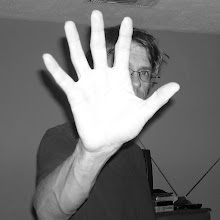In many ways Blue Velvet is an easy David Lynch film. Maybe not easy to watch, but easy to study, easy to decipher. Compared to the director's other works, Blue Velvet wears its themes on its sleeve: We see the idyllic small-town setting but also the darkness hidden underneath (the bugs). The ideas of dreams are overt, especially when Sandy tells Jeffrey about her dream and then later the dream comes true (the robin). (And let's not forget the use of the song, "In Dreams.") There is an obvious Oedipal drama as Frank Booth and Dorothy Vallens play surrogate parents to Jeffrey (using terms like "baby" and "daddy"). Finally, it is rather obvious that Frank represents a dark version of Jeffrey ("You're like me") whom Jeffrey must overcome to be free.
What's more, Blue Velvet is told is a straightforward manner (it is, without doubt, a straight story) and there are few, if any, narrative tricks at play. Blue Velvet does not confuse reality with dream; everything happens in Jeffrey's "real" world. And there are no loose ends; the film ends happily, all plotlines sewed up neat and tidy.
Greg Olson's chapter on Blue Velvet in his book, Beautiful Dark, is, like the film, short and simple. There is not a lot of revelatory analysis here because the film does not require a lot of digging to get to its secrets. Still, Olson looks carefully at the work, situating it in pop-cultural history (he shows how it fits into the changing notion of what "small-town America" means) and providing a strong and thorough critique of the themes discussed above. Olson details some great background about the casting of the film, particularly how the role of Frank Booth went to Dennis Hopper. (Hopper's reputation in Hollywood was so notorious at the time that Lynch was nervous about meeting the actor.) Olson also looks at the "timeless" setting of Blue Velvet--how it seems to defy being part of any particular era: "In Blue Velvet Lynch is pioneering a subtle stylistic motif that other filmmakers will try to copy; he's giving us an evocative dream time, an ambiguous mix of various decade signifiers in which we float around, subtly disconnected from the waking realities of our own time-bound lives" (p. 230).
There is also a good discussion of Lynch's fascination with concepts of "floating" and "falling." To Lynch, according to Olson, "floating" is positive, "falling" is negative. I hope Olson looks at this concept further in the Twin Peaks chapter: The classic opening theme music for the show, also known as "Falling," is about falling in love (and not being "hurt this time"). In the Twin Peaks universe, apparently, falling in love can be positive or negative--or both. Which leads me to think that maybe the concepts of floating and falling should be assigned more complex meanings. Floating may have to do with a sense of control, that is, one has control of his or her emotions and is therefore at peace. Falling has to do with lack of control, the idea that you can't stop a flood of emotions--positive or negative. When you fall in love you are out of control. But once in love, you can regain control, stop falling and begin to float. These ideas probably aren't much different than Olson's, but I like to think there may be more to Lynch's falling/floating dichotomy.
Olson ends the chapter before he fully discusses critical reaction to Blue Velvet. It looks like he will talk about that part in the next chapter (perhaps to show how some of the themes in Blue Velvet--and audience responses to them--propelled Lynch toward Twin Peaks). I can't wait to read it.
2 hours ago



where i come from, the birds sing a pretty song.
ReplyDelete